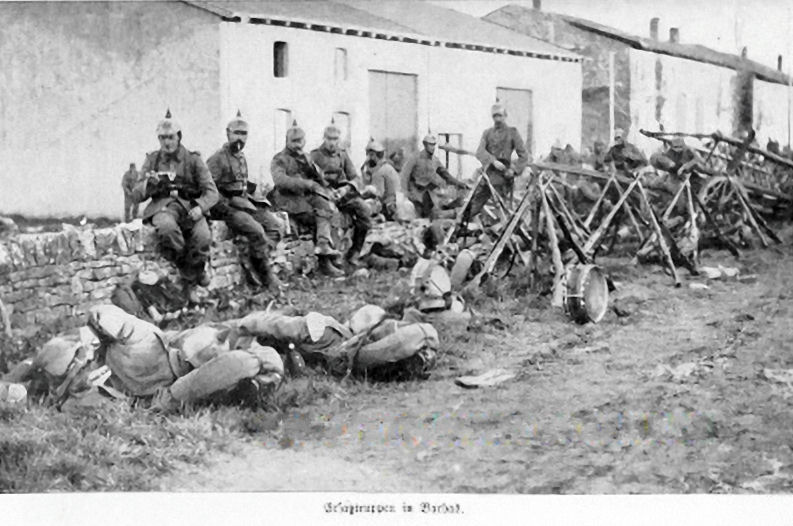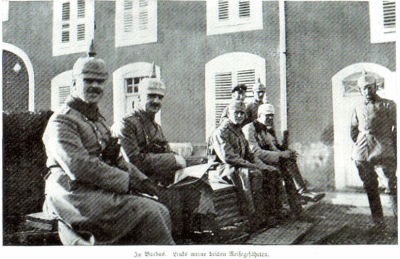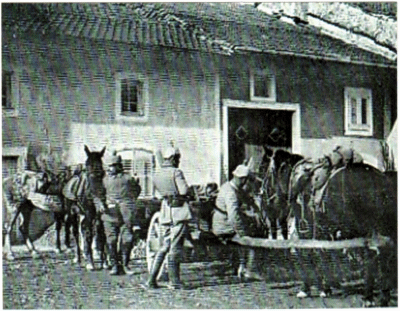Sven Anders HEDIN (Stockholm, 1865-1952) est
explorateur, notamment en Asie centrale, où il exerce ses talents de
géographe et topographe pour la réalisation de cartes (le Tibet par
exemple), et de photographe pour enrichir principalement ses propres
ouvrages.
Mais en 1914-1915, Hedin devient correspondant de guerre : ses
reportages pro-allemands lui valent d'être honoré par la maréchal
Hindenburg, mais rayé de la liste des membres de la Société géographique
royale britannique. Ils sont traduits en allemand à Leipzig en 1915 sous
le titre « Ein Volk in Waffen », et à Londres la même année sous le
titre « With the German armies in the West ».
Dans cet ouvrage, il conclut son reportage sur le front de l'ouest, par
une journée à Barbas, accompagnée de quelques prises de photographies, ce
5 novembre 1914. |
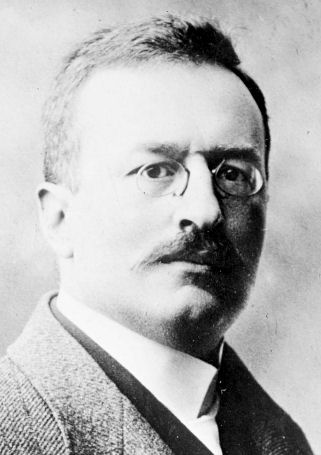 |
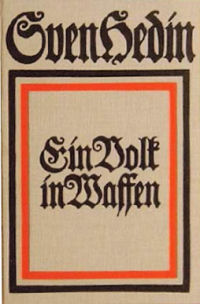 |
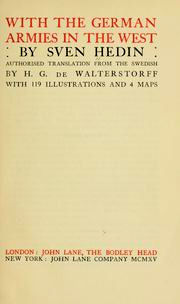 |
With the German armies in the West
Sven Hedin
Londres - New-York - 1915
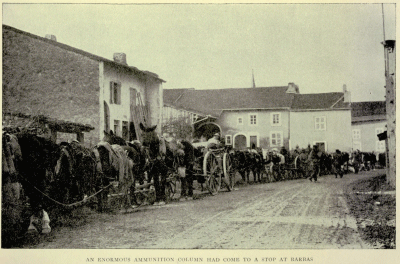
CHAPTER XXIV
A FINAL DAY ON THE WESTERN FRONT
Needless to say the human alarums at the hotel forgot to call me in the morning,
but happily I awoke without their aid and dressed quietly as a mouse so as not
to disturb Duke Adolf Friedrich. Thereupon I wandered off in the pitch-dark
night with no other weapons than my Zeiss glasses and my camera to the
Europaïscher Hof, where the others were already assembled. I was asked to join
the party in the car driven by Tauchnitz, and already occupied by Captain
Kriebel and Lieut. Baron von Peihmann, both attached to the General Command of
the Falkenhausen army.
Our road took us south-eastward via Chateau-Salins in German Lorraine. We
crossed into France further south at Rixingen.
It was 7 o'clock when we started off. Day was just beginning to break, but the
sky looked threatening, the weather was most unpleasant, and a thin layer of
clayey mud lay over the hard surface, making the road as slippery as soap. My
two companions inside were as agreeable and as light-hearted as all other German
officers whom I had met. As we were skimming along, the pretty and interesting
country we were passing through was being explained to me on the map. We were
only a few kilometres from Rixingen when one of the pipes of the engine broke,
and the car absolutely refused to move another inch. However, providence has
presented us with legs, and so after walking a short distance we came upon a
motor-driven hospital wagon, on the roof of which we made ourselves comfortable.
We were soon to find that this motor conveyance was not without its dangers, for
the wagon skidded about terribly on the slippery road and threatened any moment
to dive into the ditch. However we held ourselves ready for any emergency so as
at least to fall feet foremost when the catastrophe came. In the end we managed
to get to Rixingen and reached the commandant's office just as the wagon began
skidding so hopelessly that the back wheels took command and the whole
bag-of-tricks was on the point of overturning. Our somewhat eccentric entry into
Rixingen aroused violent mirth from all who happened to be about. Here, however,
we secured a third car and drove on gaily to Blamont.
On leaving the village to the southward, the road turned up a hill to a slight
eminence, the right-hand side of which was wooded. In a field immediately to the
north of the little wood and evidently concealed by its trees, stood a battery,
which was thundering away for all it was worth. It was really a very impressive
sight to watch the guns firing their salvos.
The officer in charge gave his orders in a loud voice according to the
information received from the observing station. Then followed the usual brief,
brisk words of command : “Load ! Ready !! Fire !!!” The target for the moment
was the village of Ancerviller, situated about 5600 metres south of Blamont.
As the gun is discharged a sheaf of fire issues from the muzzle and a white
smoke cloud forms several metres in front.
In order not to attract the attention of the enemy, instructions have been given
that the battery must only be approached on foot. On the crest of the hill stood
the local commanding officer, Lieut.-Gen. von Tettenborn, acting Adjutant-General
to the King of Saxony, surrounded by his staff, some twenty officers. He was a
powerfully built little man with steel-grey hair and moustache. Hung over his
shoulders he carried a light brownish-grey cape with red collar and on his head
he wore a helmet with a grey cloth cover. Reports kept pouring in regarding the
progress of the action. Now it was a horseman, now a motor-cyclist, now a car
that came tearing along at full speed with information, whilst orders were sent
out with equal rapidity to the various fighting units.
General von Tettenborn received me with the greatest kindness and we stood
chatting awhile on the hill as if there had been no war within a hundred miles.
I was also introduced to all the other officers and in two minutes I felt
thoroughly at home. The general atmosphere here was exactly the same as I have
had occasion to record and admire all along the front, calm, reliant and
cheerful in the consciousness of the monstrous strength of the German army.
Two kilometres south of Blamont and about half that distance from the point
where we were standing, lies the little village of Barbas in a picturesque
hollow, its church tower dominating in a lordly manner the pretty little red-roofed
stone houses beneath. One and a half kilometres south of Barbas, sharply
outlined against the light rising background, were two little dark clumps of
trees. On the north side of these coppices two German batteries were actively
shelling the enemy positions. On the western border of the wooded belt to the
right infantry fighting was in actual progress. At the moment the Germans were
proceeding to the attack of the French positions. Both sides had concealed
themselves gingerly behind trees and bushes, but the rattling fire from rifles
and machine guns was deafening. One moment the shots would succeed one another
in a continuous din, the next minute one heard but isolated reports. Of the
actual fighting itself we saw nothing, but it became evident in the course of
the day that the centre of activity was shifting south-westward, which meant
that the German attack was progressing.
Behind us the battery at which we had just stopped kept pounding away, and once
more we heard the horrible, sinister whistle of shells pass overhead. The German
artillery was very active, but the French did not reply to the fire. Towards the
afternoon the German fire also ceased, the attempted goal having been reached.
It was assumed that the French batteries, which had but lately occupied this
point, had now been removed to some other place where they would come in more
useful. I for my part was quite content to do without their fire, and it was a
pleasant and restful experience not to have to be in constant dread of a shell
coming on the top of me.
The day before the French had sent a couple of shells into Blamont, but without
doing any appreciable damage. Neither did we see any aviators on this occasion.
I was told that they were less numerous in these parts.
After a short visit to Blamont cemetery and a walk through the pretty village,
where we dined, I returned with a couple of officers to the hill, but found it
deserted. The General and his Staff had, it appeared, advanced a couple of
kilometres to Barbas, where we found all the officers assembled in an open space,
a cross between a street and a market-place. This had now become the point from
which the operations on the whole front of the division were directed, and
horsemen and cycle-orderlies kept dashing backwards and forwards as before on
the hill.
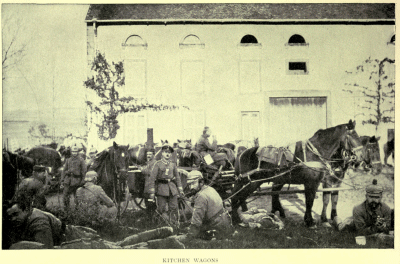
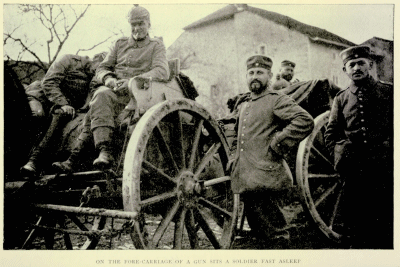
I remained at Barbas for another four hours and took the last photographs
destined to appear in this book. Wherever I turned, I found picturesque and
warlike subjects for my camera. In the open space referred to, officers with
maps in hand stood gathered in little groups. Outside a house, several horses
stood ready for the orderlies. In the next street, which was part of the great
main road, an ammunition column had halted. It extended from one end of the
village to the other and a bit beyond as well. The wagons were crowded with
artillerymen, full of life and in good spirits as usual, and they usually asked
for a photograph when I came along with my camera. On the fore-carriage of a gun
sat a man fast asleep. In the outskirts of the village two companies of reserves
had halted and were evidently waiting to take their place in the firing line.
“How are you, boys ?” I asked.
“Oh, first-rate, but it's a nuisance to have to lie and wait like this."
"What are you waiting for ?"
"Why to go ahead and fight, of course."
Here I found a chaplain, a strikingly humorous and amusing man, who knew
thoroughly how to get on with the soldiers ; but then he had been in war before,
in Pekin and German South-West Africa. As we stood chatting on the road, we were
gradually surrounded by a narrowing circle of grey jackets, who listened
intently to what we had to say. In the end they must have numbered fully 150,
and there, in the centre, stood the pastor throwing out jests and calling them
his grey field-mice, and they all laughed gaily at his whimsical ideas.
"What do they do for a living in peace time, I wonder, all these soldiers ?" I
asked.
"Oh," said the pastor, "there are all sorts, loafers and county councillors,
blacksmiths and professors, all jumbled together.
"What is your occupation, my lad ?" he asked of one who stood near, as he seized
him by the collar.
"Lecturer," he answered.
"What subject ?"
"Comparative philology of modern European languages."
"Excellent ! There you see, doctor, what use the philology of modern European
languages can be put to !"
"And what are you ?"
"Metal worker at Siemens and Halske's."
"And you ?"
"Village schoolmaster."
"And you ?"
"Navvy."
"And you ?"
"Professor of zoology."
"There you see the levelling effects of war. No trace of class distinction. They
all lie side by side in the trenches, eat the same food and are comrades through
thick and thin, and the professor is no better treated than the navvy."
"How many of you are keeping diaries of your war experience ?" I asked.
"I don't write a line," said one, standing with his hands in his pockets in
front of the circle.
"Why not ?"
“There are plenty of them who do as it is."
"Nonsense, you are a lazy beggar," says the pastor.
"All who keep diaries, put up their hands," said I, and a perfect forest of
hands rose into the air.
"Perhaps it will be simpler if those who don't keep diaries put up their hands."
They did so, and there were ten out of fully 150. What a monument of memories
and impressions, of wild adventures and heroic deeds told in simple and honest
words must they not represent, these diaries, written from day to day between
the fights, in the trenches and by the light of the bivouac fires !
To conclude, I asked in a loud voice although it was a stupid thing to do and I
ought to have known better - infandum jubes renovare dolorem : "How many of you
are social democrats ?"
At this there was a shout of laughter, almost of derision, and I suddenly felt
exceedingly awkward and wished I were back at Metz again. Even the pastor
laughed and shook his head. At last a burly-looking soldier answered for himself
and the others :
"There are no social democrats any more. There are nothing but German soldiers."
I made a desperate attempt to cover my retreat by saying : "Of course, of
course, I know ; but are there any among you who have been social democrats ?"
Some shouted no, others shrugged their shoulders and one replied : "Even if
there have been social democrats among us, all that rot has been washed away by
now. It is real and serious business we are dealing with now, and none of that
kids' game !"
Presently the men were ordered to form up and the circle melted away, leaving me
alone with the divisional pastor and three young officers with whom I chatted
for a few moments.
Then I went back to my friends and travelling companions from Metz. The day's
work was over. The result of the achievements of the day had been reported to
the General in Command, but they had to wait at Barbas until fresh orders
arrived, which might not be until midnight. For my part I could return to Metz
whenever I wanted to.
The sun had long since set when Captain Kaufmann came up and offered me a seat
in his car. He was a fine fellow and had moreover many memorable and interesting
things to tell me from his experiences in the war. So I said good-bye to my
charming host for the day, General von Tettenborn, and the other officers,
jumped up beside Kaufmann and a lieutenant and in a second we were on the way,
eating up the ninety kilometres separating us from our destination in the north-west.
We had our head-lamps lighted. At least twenty times we were stopped by the
patrols guarding the road, who swung their lanterns across the road and shouted
"halt ! " I consider we were very fortunate to get through with a whole skin,
for if one overlooks a single sentry, it is all up and one gets a bullet through
the back. There were numerous cavalry patrols about, evidently on their way home
after their scouting in the gloaming. They, too, were stopped by the pickets,
for otherwise French patrols in German uniforms might easily infest the roads
and villages held by the Germans. We were also stopped on entering and leaving
every village.
However, at last we got safely back to Metz, and thus ended my last day at the
front.
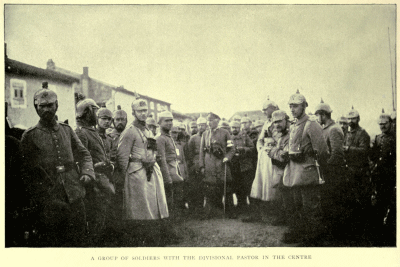
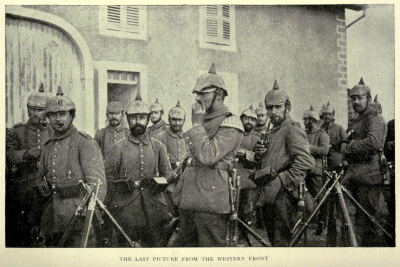
Notes : si la “dernière image du front de l'ouest” ci-dessus est prise à
Barbas ce 5
novembre 1914, alors la suivante, pourtant classée dans le chapitre VII, l'est
aussi :
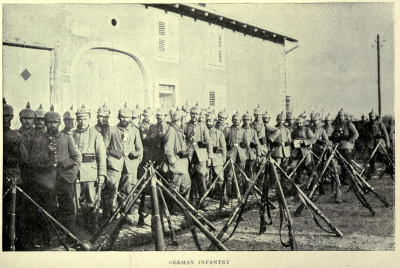
|
















